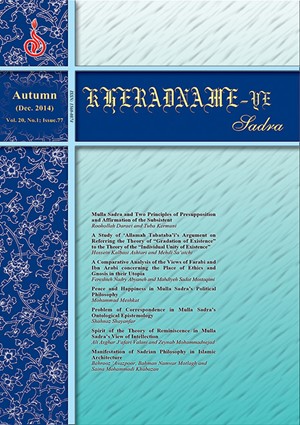-
-
List of Articles
-
Open Access Article
1 - سرمقاله
Seyyed Mohammad Khamenei -
Open Access Article
2 - Mulla Sadra and Two Principles of Presupposition and Affirmation of the Subsistent
Tuba Kermani Roohallah Daraei -
Open Access Article
3 - A Study of ‘Allamah Tabataba’i’s Argument on Referring the Theory of “Gradation of Existence” to the Theory of the “Individual Unity of Existence”
Hossein Kalbasi Ashtari Mehdi Sa‘atchi -
Open Access Article
4 - A Comparative Analysis of the Views of Farabi and Ibn Arabi concerning the Place of Ethics and Gnosis in their Utopia
Fereshteh Nadry Abyaneh -
Open Access Article
5 - Peace and Happiness in Mulla Sadra’s Political Philosophy
Mohammad Meshkat -
Open Access Article
6 - Problem of Correspondence in Mulla Sadra’s Ontological Epistemology
Shahnaz Shayanfar -
Open Access Article
7 - Spirit of the Theory of Reminiscence in Mulla Sadra’s View of Intellection
Ali Asghar J‘afari Valani -
Open Access Article
8 - Manifestation of Sadrian Philosophy in Islamic Architecture
Behrooz ‘Avazpoor Bahman Namvar Motlagh Saina Mohammadi Khabazan
-
The rights to this website are owned by the Raimag Press Management System.
Copyright © 2017-2026







